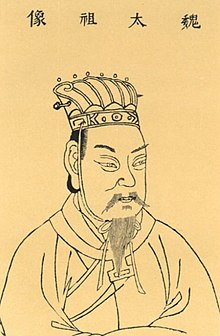Cao Cao
Chinese warlord and statesman (155–220)
Cáo Cāo (Chinese: 曹操; Wade-Giles: Ts'ao Ts'ao; c. 155 – March 15, 220) was a Chinese military leader, a regional warlord and the penultimate chancellor of the Eastern Han Dynasty, who rose to great power during its final years in Ancient China. As one of the central figures of the Three Kingdoms period, he laid the foundations for what was to become the Kingdom of Wei (also known as Cáo Wèi) and was posthumously titled Emperor Wu of Wei (魏武帝)

Sourced
edit- 「寧我負人,毋人負我!」
- Translation: "I'd rather betray others, than have others betray me."
- Statement in 190, after falsely killing Lü Boshe. Source: Sun Sheng Zaji, page 5 of Sanguo Zhi.
- 「吾任天下之智力,以道御之,無所不可.」
- "I would employ the wise and strong of the empire, using righteousness to lead them. In this way, nothing is impossible."
- Statement by Cao Cao around 191 during a discussion with Yuan Shao. The two compare their long term strategies, with Cao giving an abstract approach. The conversation is generaly considered to be fictional, and recorded only for allegorical effect. Source: Sanguo Zhi, page 26.
- 「彼各為其主,勿追也。」
- Translation: "Each man is for his lord, do not give chase."
- Statement to his retainers in 200, referring to the recently left Guan Yu. Source: page 940 of Sanguo Zhi.
Attributed
edit- 「宁可我负天下人,休叫天下人负我。」
- Translation: "I will rather I wronged all the people under the heavens than for all the people under the heavens to wrong me."
- Statement to Chen Gong after falsely killing Lü Boshe and his household. Source: Romance of the Three Kingdoms. An adaptation of the Sanguo Zhi new 2010.
- likely intentional misquote by the novel of the quote「宁我负人,毋人负我」above to add character to the story.
- 「知错改错,不认错。」
- Translation: "Recognise and acknowledge your mistake, but never admit your mistake".
- Statement to one of his advisors when he realised that Cao Cao made a mistake. Source: Romance of the Three Kingdoms. An adaptation of the Sanguo Zhi new 2010.
- 「兵不在多在精,将不在猛在某」
- Translation: "It's not size that counts in an army, but skill. It's not prowess that counts in a General, but finesse.".
- Statement from Cao Cao to his advisors before he face Yuan Shao in the Battle of Guandu Source: Romance of the Three Kingdoms. An adaptation of the Sanguo Zhi new 2010.